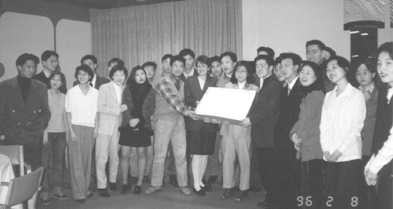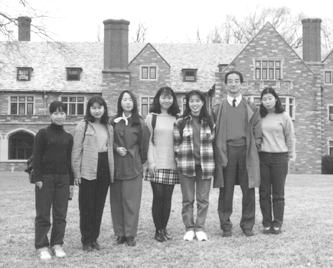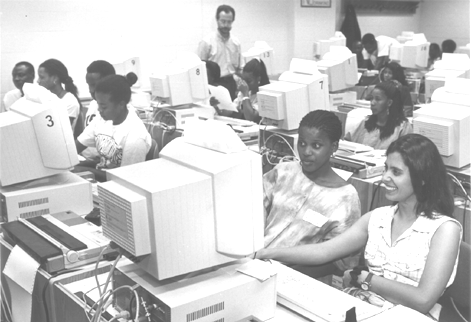 Students in the Hankuk program with Lisa Grimsley, program coordinator (center), gathered together for their ELI graduation.
Students in the Hankuk program with Lisa Grimsley, program coordinator (center), gathered together for their ELI graduation.
In January, 29 Korean students from the Hankuk University of Foreign Studies in Seoul, Korea, escorted by Mr. Song Kuen Lee and Professor Byung Ock Chang, arrived at ELI. Just after orientation coordinator Sharon Scott and program coordinator Lisa Grimsley finished moving the students into dormitory rooms, the predicted "Blizzard of '96" hit Newark, DE. Naturally the program schedule had to be adjusted for a couple of days while snow removal teams dug the city out from under more than 16 inches of snow. One student's package, an ice chest containing a jar of homemade kim chi, was misplaced on the plane trip over, but much to the enjoyment of several participants, the airline recovered the package and sent it to ELI. Despite first week difficulties, spirits among the program participants remained high.
 Students in the Hankuk program with Lisa Grimsley, program coordinator (center), gathered together for their ELI graduation.
Students in the Hankuk program with Lisa Grimsley, program coordinator (center), gathered together for their ELI graduation.
From six to 16--from deep winter to mid-summer--the two Kobe Shoin Women's University Study Programs experienced Newark in diverse situations. Though many of the students had gone through the Kobe earthquake, most had not seen much snow. While the East Coast suffered one of its most severe winters, six Shoin students learned to navigate through the deep snow to daily classes with hardly an absence.
The 16 summer students were mainstreamed into the morning intensive classes as well as managing their extensive cultural program organized by coordinator Janet Louise, which included a weekend and other outings with their host families and teaching origami to young Americans at a YWCA Youth Camp.
 Kobe Shoin Women's University students, with Professor Ken Tamai, visited St. Andrews School, site of The Dead Poets' Society filming.
Kobe Shoin Women's University students, with Professor Ken Tamai, visited St. Andrews School, site of The Dead Poets' Society filming.
In March, ELI hosted for the first time a group of students from Hiroshima Institute of Technology (HIT) in Hiroshima, Japan. The 26 students, accompanied by Dr. Yoshiko Tagashira, attended ELI class for three weeks and on weekends took overnight trips to Boston, New York and Washington.
ELI looks forward to future programs with HIT, and the coordinator, Joe Matterer, would like to thank everyone involved in the program, especially Dr. Tagashira of HIT and Dr. Mamoru Tsuru, vice chairman of the HIT Board of Directors. A special bond exists between Dr. Tsuru and ELI: both he and his wife attended classes here and maintain close personal ties with ELI faculty members and staff.
In June, ELI, in conjunction with the Institute of International Education and the University of Delaware Special Programs, offered a special three-month program for Colombian professionals from the fields of business, medicine, science and engineering: "Fundacion para el Futuro de Colombia," COLFUTURO. Fifteen participants arrived from Colombia, South America with plans to attend U.S. universities in 1997. Coordinator Leslie Criston arranged for special seminars twice a week on cultural and academic topics pertinent to university students. In addition to attending regular ELI classes and labs and an evening TOEFL preparation course, the Colombians attended university classes in their various disciplines and were taught the mechanics of researching and applying to American universities. This was ELI's first COLFUTURO program, and because of its success, the "second wave" began in November with Russ Mason as coordinator.
For the fourth year, ELI hosted the Summer Institute for English as a Foreign Language Educators from Francophone and Lusophone Africa [SIEFL]. The program had originally been slated for discontinuation due to cutbacks in U.S. government funding, but because of the demand from the EFL community in Africa, last-minute funding was found for the 1996 program. Academic coordinator Grant Wolf, with the assistance of orientation coordinator John Schneider, saw to it that the African teachers and administrators were enrolled in an extremely intensive program of professional seminars, observations and cultural activities. The participants also maintained the SIEFL tradition of organizing a professional EFL educators' conference at the end of the session, followed by "Africa Night," a memorable celebration of African culture and hospitality.
 The SIEFL program included training in word processing and desktop publishing.
The SIEFL program included training in word processing and desktop publishing.
Currently, ELI is working with the U.S. Information Agency on a proposal for future African teacher training programs to build on the strong foundation of professional training and community involvement that has been achieved at the University of Delaware over the last four years.
During the summer, the Royal Thai Ministry of Education and the Edmund S. Muskie Scholars Program sent 15 students from five countries to study advanced academic skills as preparation for graduate school in the United States. Ten men and women from Thailand, together with students from Japan, Laos, Israel and Peru, studied topics in their own fields as they learned the structure and focus of American graduate education. The students also had the opportunity to make excursions to places of interest in the area and to meet and form relationships with American graduate student mentors. Their teachers and coordinator Mary McCloskey were delighted to work with such diligent, outgoing and interesting individuals.
Last summer, seven women from Brazil participated in a special three-week language and culture program at ELI. One participant is a judge and the others, who study English together, are wives of judges. The group was accompanied by their English teacher, Marcia Cardoso, and by the organizer of the program, Beatriz Gouvea. ELI's Wendy Bulkowski and Joe Matterer were the coordinators for the program. While studying at ELI, the women had the opportunity to visit the Philadelphia Art Museum and historic sites of Philadelphia, the Amish country near Lancaster, the Inner Harbor of Baltimore, Longwood Gardens, Washington D.C. and New York City. The English Language Institute is fortunate to have hosted this delightful and energetic group of women.
The Korean Ministry of Home Affairs program was held at ELI from August 10 until November 2, 1996. This program was part of a larger initiative by the Ministry to improve local government in South Korea. The participants were mid-level managers recently recruited by competitive examination. Their stay at the University of Delaware was part of a year-long program coordinated by Aspect International.
The eleven participants attended a "jump-start session" led by Joe Matterer and June Quigley, following which they were placed in the regular ELI program for the entire session. In addition, academic coordinator James Slater designed a special program with an emphasis on the delivery of government services, globalization, the Internet and cross cultural communication. Melody Holm-Terasaki also instructed in cross cultural communication, and Chris Wolfe presented an introduction to the U.S. legal system.
Academic work was supplemented by numerous field visits to local government operations and job shadowing internships. This was the first program of its kind for the Ministry of Home Affairs.
During the four intense weeks of the Summer International Business Institute (SIBI), participants are immersed in American business through corporate visits, seminars and classroom instruction. All eight participants in the 1996 SIBI, organized by academic coordinator Michelle Kline, were previously ELI students. The students became acquainted with entrepreneurs as well as with corporate executives through visits to ACRO/Slocomb, Composites USA, Happy Harry's, Wilmington Trust, McDonald's headquarters, Port of Wilmington and Delaware Cold Storage. Besides these visits, the students attended informative seminars given by professors from the College of Business and Economics at the University of Delaware and by professionals from DuPont, Dean Witter & Reynolds and the Delaware Development Center.
Eighteen University of Granada students and their escort, Inmaculada Sanz, arrived in Newark on June 30 to begin a six-week Intensive English Program. Majoring in English language or literature at the University of Granada, the students seized the opportunity to increase their English skills in academic areas as well as to expand their knowledge of American culture by taking a variety of courses, including American Culture, General English and English for Academic Purposes. Cultural activities were also a part of the six-week program, with trips to Washington, D.C. and New York City organized by their academic coordinator, Susan Edgell.
By special arrangement between ELI and the International Independent University of Ecology and Politology, five students made the journey from Moscow to Newark last summer to join other students and professionals from around the world for English language study during Session VI. The five Russian students joined the regular ELI program in Listening/Speaking and Reading/Writing classes in Levels I, II and III. Russ Mason served as the group's coordinator. In addition to joining colleagues from all over the world, the Russian visitors enjoyed meeting other students who happened to be at ELI from Ukraine and other parts of the former Soviet Union. All seemed pleased with their cultural and linguistic adventure in America.